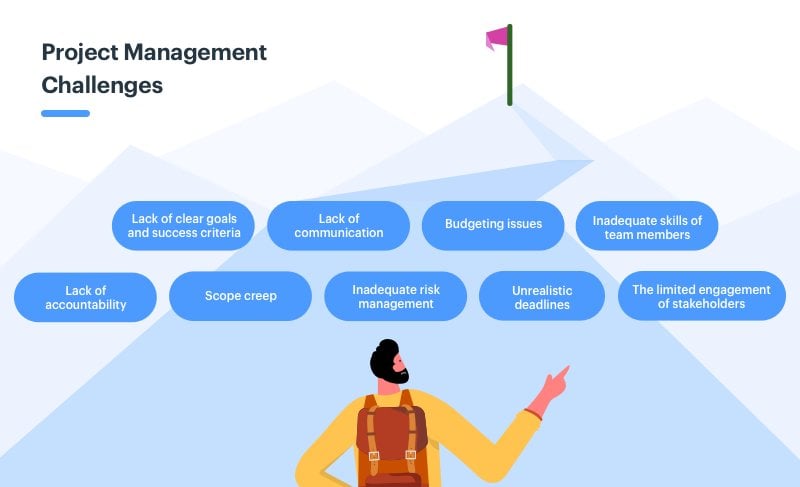Whether you are someone just starting your career in the field of project management or have a lot of experience, you’ll agree that being a project manager is not simple.
You need to constantly stay on your feet by learning the project management basics and ensure that the project remains within all the agreed-upon project constraints like
- Time
- Project scope
- Budget
Despite the availability of multiple resources, project management tools, training materials, and flexible methodologies, companies are still wasting millions of dollars every year and are struggling to tackle the project management challenges and issues they face.
A study published in the Harvard Business Review states that one in every six projects costs more than 200 percent of the estimated amount and almost 70 percent of IT projects face project delays. It is the job of project managers to prevent that but in doing so they face a lot of challenges.
We have created a list of the nine most common issues project managers face along with advice on how to deal with them when they arise.
1. Scope creep
Scope creep is a natural and expected phenomenon for any project. There are times when it can be beneficial but mostly the cons outweigh the pros. 52% of project teams reported facing scope creep in 2017 and the trend is continuing upwards. Clients who don’t precisely know what they want and have vague requirements are one of the biggest project management challenges for both managers and the project team.
How to deal with it:
Proactively engaging with clients during the project planning phase can help you get their exact requirements as well as understand their expectations. Additionally, planning your resource and talent usage accurately is also key. It’s also important to not take up ad-hoc change requests during project execution as this can result in delays and added costs. Stick to the initial plan.
2. Lack of communication
Effective communication in project management is extremely important for a successful project. You need to have timely and transparent methods of communication to ensure that all stakeholders are involved in the process.
Deloitte states that 32 percent of professionals believe that communication is the biggest issue of project management.
Miscommunication is also dangerous for project teams because it affects their teamwork. It can cause conflicts among team members and can potentially delay the project.
How to deal with it:
Project managers often rely on various collaborative and project management software available in the market in order to ensure that everyone stays updated.
Project collaboration tools not only make it easier for managers to carry on their duties but also ensure greater transparency in projects and accountability within the team. This is achieved through features such as contextual comments, @mentions, and priority assignment capabilities.
Additionally, regular, short stand-up meetings a few times weekly can go a long way in preventing miscommunication.
3. Lack of clear goals and success criteria
Clarity is one of the most important requirements for the successful completion of the project and the lack of it creates several project management issues. A study states that about 39% of projects fail due to the lack of a project plan and a clearly defined project goal.
It is also important for a project manager to come up with a way of quantifying project progress by setting up project milestones and quality tests.
In addition to helping your team progress, having a clear set of objectives will also help project managers defend their vision in front of the upper management and the customers.
How to deal with it:
Popular approaches to goal setting like SMART and CLEAR can help a project manager come up with a set of effective goals right from the start of a project. This can help overcome the barriers of project management. Additionally, one must keep in mind that not clearly defining goals is a mistake. Therefore, once you create goals for your project team, make them obvious to teammates. Document them.
4. Budgeting issues
Most managers consider financial issues as one of the biggest hurdles in effective project management. A study in 2017 revealed that 49.5 % of manufacturing managers report costs as the biggest project management challenge they face.
By efficient cost management, a manager can avoid various common complications a project may face and strive for better and quicker results.
How to deal with it:
It is absolutely necessary to adopt a proper project scheduling tool, budgeting procedure and make realistic assumptions to avoid cost overruns. Planning the project scope must be done keeping in mind the budget in hand. Else, budget limitations could threaten the very success of a poorly budgeted project. Like everywhere else in project management, documenting is key.
5. Inadequate skills of team members
A chain is as strong as its weakest link and in the case of project teams, performance highly depends on their individual skill levels.
As a project manager, you can create the most ideal environment but if the team does not possess the necessary skills to tackle the problem at hand, your project is bound to fail.
This is a huge project management problem that can only be solved with proper experience and foresight.
How to deal with it:
Effective project managers pre-determine the needed project management skills and competencies and assess the available workforce to determine whether t additional staff and skillsets are required or not.
An effective project initiation plan will deal with the needs of the project and the resources required to accomplish it. These resources include the human skill component as well. The project plan will further build upon the groundwork of the initiation document.
6. Inadequate risk management
Having the foresight to identify potential ‘what if’ scenarios and making up contingency plans is an important aspect of project management. Projects rarely go exactly as planned because there are so many variables that can create unlimited possibilities.
How to deal with it:
It is the job of every project manager to come up with alternate plans that the team may adopt if the project begins to spiral out of control.
Having a project risk management system helps in identifying the types of risks and mitigating them.
Having a contingency plan in place is critical. This plan should identify all risks that the course of action to be taken if they materialize it.
7. Lack of accountability by Project Manager
A project team performs really well when every member feels responsible and tries to fulfill the role assigned to them. Lack of accountability on the part of team members can sink an entire project.
How to deal with it:
Effective project managers assign responsibilities to team members and direct the team toward the common goal of successfully completing their project.
Having a project tool that allows responsibilities to be assigned and tracked is key to fostering accountability. Additionally, having regular check-ins within the team also fosters accountability.
8. The limited engagement of stakeholders
It is important for project managers to ensure that all the project stakeholders are on the same page and have a clear vision of the project.
An uninvolved client can cause a lot of problems in the final stages of a project so it’s important to consider the customer’s feedback and keep them updated throughout the project.
How to deal with it:
Invite your client and other stakeholders to your project management tool so they can actively participate in shaping the project and providing feedback.
Further, ensure that you keep all internal and external stakeholders in the loop right from the project planning stage. Schedule regular meetings with all stakeholders and address their concerns as required.
9. Unrealistic deadlines
Having an impossible deadline is another project management challenge that can severely affect the quality of the end product. Any effective project manager knows the capability of the project team and negotiates the project timeline by prioritizing deadlines and project tasks.
How to deal with it:
In agile project management, velocity, which is the measure of work completed in a single sprint, is decided collectively by taking inputs from all stakeholders. This is done during the planning phase of the project. Further, frequent monitoring of deadlines by the project manager is a must.
This ensures that any increase in scope (scope creep) during the execution of the project is either avoided or timelines modified as required.







Leave A Comment
You must be logged in to post a comment.